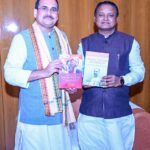THE SWAMI AND THE MAHATMA
- By : Anirban Ganguly
- Category : Articles
Louise Burke noted that Vivekananda wanted to spread the Master’s message not only to Europe and Asia but also to South Africa, where an Indian community lived
In her path-breaking multi-volume study, Swami Vivekananda in the West — New Discoveries, one of the few encyclopaedic works on Swami Vivekananda’s actions in the West, Marie Louise Burke (Sister Gargi) of the Ramakrishna-Vivekananda Order, drew attention to an interesting and a deeply symbolic detail.
Louise Burke noted how Swami Vivekananda wanted “to spread the Master’s message not only to Europe and Asia but also to South Africa, where an Indian community was living on uneasy terms with the British”. On the request from a ‘Bombay friend’ to send someone to look after the religious needs of the Indian emigrants (there), Swami Vivekananda considered for a while sending one of his young brother monks to give succour to the community. “The work will not be congenial at present, I am afraid”, he wrote to this brother-disciple, adding, “but it is really the work for a perfect man. You know the emigrants are not liked at all by the white people there. To look after the Indians, and at the same time maintain cool-headedness so as not to create more strife — is the work there. No immediate result can be expected, but in the long-run it will prove a more beneficial work for India than any attempted.”
Swami Vivekananda’s demand for more information on the conditions of Indians in that region was satisfied by a certain ‘young barrister who was then living in Durban, Natal, and championing the rights of his people.’ In his letter, dated February 23, 1898, written to a High Court pleader and disciple of the Swami in Bombay, barrister MK Gandhi spoke of the need for a “religious preacher” who must “tower above all the priests here” and must be “absolutely pure-minded and unselfish and must not require money to support him”.
Speaking of the future, where India would proactively cater to the welfare of Indians beyond the seas, barrister Gandhi, presciently wrote, “If we are to be self-governing at any stage of our national life we would send out doctors to look after the health of our people outside India, lawyers to give them legal advice but more particularly to find out their grievances and voice them and priests to keep up the national religions.” Barrister Gandhi concluded his letter with an appeal for the Swami’s personal intervention, “could not the Swami himself”, he wrote, “be induced to pay a visit? I shall do everything I can to make his mission a success…I very rarely write unreservedly but I thought this was one of those occasions when it is allowed to & even obligatory on a man to throw off his reserve.” Barrister Gandhi’s letter was forwarded to the Swami, then in Kashmir.
Years later, in 1901, as a quite unknown delegate to the Calcutta session of the Indian National Congress, MK Gandhi, walked all the way to the Math at Belur to try and meet the Swami. “It was impossible” Gandhi later wrote “to be satisfied without seeing Swami Vivekananda. So with great enthusiasm I went to Belur Math…I was disappointed and sorry to be told that the Swami was at his Calcutta house, lying ill, and could not be seen.”
In between, elapsed two decades before Gandhi returned — the barrister had by then metamorphosed into the Mahatma. In 1921, on a visit to the Math at Belur the Mahatma movingly spoke of Vivekananda’s deep impact on his understanding of India, “I have come here (Belur Math) to pay my homage and respect to the revered memory of Swami Vivekananda, whose birthday is being celebrated today. I have gone through his works very thoroughly, and after having gone through them, the love that I had for my country became a thousand fold. I ask you, young men, not to go away empty-handed without imbibing something of the spirit of the place where Swami Vivekananda lived and died.”
The centenary of the Mahatma’s return to India brings such thoughts on the surface…

















